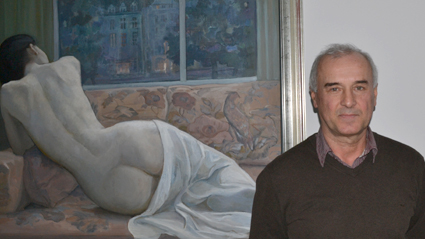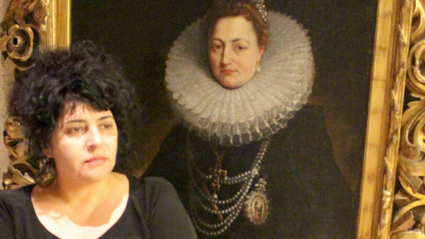Faking paintings is a problem globally, with Bulgaria no exception. An astonishingly large amount of art forgeries have been pouring onto the auction market for dozens of years. And sometimes the imitations even fetch higher prices than the originals.
This is a “business” that is lucrative for many, among them dealers and artists. Whose paintings are forged most often? The answer from Emil Choushev, restorer of paintings and manager of an auction house and gallery in Sofia:
 “It all boils down to how much a given artist costs. The higher the price of the original painting, the more often the painter himself gets forged for the simple reason that it makes good business sense. The goal is instant profit. It is very rare to see forgeries of works by artists who do not fetch high prices, because there’s no money in selling illegal copies. The most widespread forgeries are of works by artists like Vladimir Dimitrov – the Master, Zlatyu Boyadjiev, Tsanko Lavrenov, Boris Denev, Danail Dechev, Nikola Tanev. If we take a look at the top 20 of Bulgaria’s old masters, we shall see that at least 19 of them have been forged.”
“It all boils down to how much a given artist costs. The higher the price of the original painting, the more often the painter himself gets forged for the simple reason that it makes good business sense. The goal is instant profit. It is very rare to see forgeries of works by artists who do not fetch high prices, because there’s no money in selling illegal copies. The most widespread forgeries are of works by artists like Vladimir Dimitrov – the Master, Zlatyu Boyadjiev, Tsanko Lavrenov, Boris Denev, Danail Dechev, Nikola Tanev. If we take a look at the top 20 of Bulgaria’s old masters, we shall see that at least 19 of them have been forged.”
Bulgarian art is held in high regard, though mostly inside Bulgaria. For years the market demand has been higher than the supply. That is the reason why forgeries form such a large portion of the works sold at auction. Frequently collectors buy art costing thousands of leva only to find, too late for anything to be done about it, that what they have bought are forgeries. Here is more from Kristina Beleva, restorer at the National Gallery:
 “The market is narrow with few works of art. We have only had secular art for around 100 years and the works that are available have already been taken by private collectors. Whereas forgeries are available to people who want to call themselves collectors. There are collections with 80 percent fakes, though the collectors would never admit it. There are people who refuse to take out an official certificate of the works they own – they have invested large sums and that would mean losing money. But it also means ruining their reputation.”
“The market is narrow with few works of art. We have only had secular art for around 100 years and the works that are available have already been taken by private collectors. Whereas forgeries are available to people who want to call themselves collectors. There are collections with 80 percent fakes, though the collectors would never admit it. There are people who refuse to take out an official certificate of the works they own – they have invested large sums and that would mean losing money. But it also means ruining their reputation.”
Of course, there is a difference between legal copies and forgeries. Some collectors are happy enough to own paintings knowing full well that they are not originals. What is the difference between legal and illegal copies – Emil Choushev:
“A copy must differ from the original. Usually the difference is in the dimensions, it has to be either bigger or smaller than the original. Real replicas are created from the original, not from a reproduction. Whereas forgeries aim to copy a painter, to imitate him in a way that is not always very good, so as to pass the copy off as an original. Under the Cultural Heritage Act, legal copies are signed and dated. If you want to make a copy of a work at the National Gallery, you would have to get permission, pay a copyright fee etc.”
Experts say water colours are the paintings most difficult to forge, because the slightest mistake is fatal and you would have to start all over again. Interestingly, to get a high quality forgery you need a good artist, someone willing to barter their talent for money. This artist knows he would never be punished by the law, because the sanctions for forgery are minimal, most often than not a fine. Under the Cultural Heritage Act penalties are more severe for dealers peddling paintings that are more than 50 years old without identification papers. They could face a prison term of 2 to 6 years.
Art forgery certainly is an epidemic and the only way to stop it is to put in place more severe penal sanctions for people ready to drag the names of renowned Bulgarian artists through the mud for a buck.
English version: Milena Daynova
Photos courtesy of Luisa Lazarova, Emil Choushev and Kristina BelevaThe Bogdan Khmelnitsky Melitopol State Pedagogical University, together with the Shumen University "Bishop Konstantin Preslavsky", organize the ninth International Bulgarian readings "Youth in Science without Borders", which will be..
"Bulgarians decorate the world," tells us Emilia Juеcker, who has been living in Germany for decades. The diversity of our cultural traditions, literature, and folklore is at the heart of the seventh annual meeting "Bulgarian Speech, Music, Colors and..
The second edition of the Festival of Bulgarians and Descendants of Bulgarians in Argentina will be held on November 30 at the San Juan Bosco School in the Argentine city of Comodoro Rivadavia. “This Saturday, our beloved society will welcome..

+359 2 9336 661
